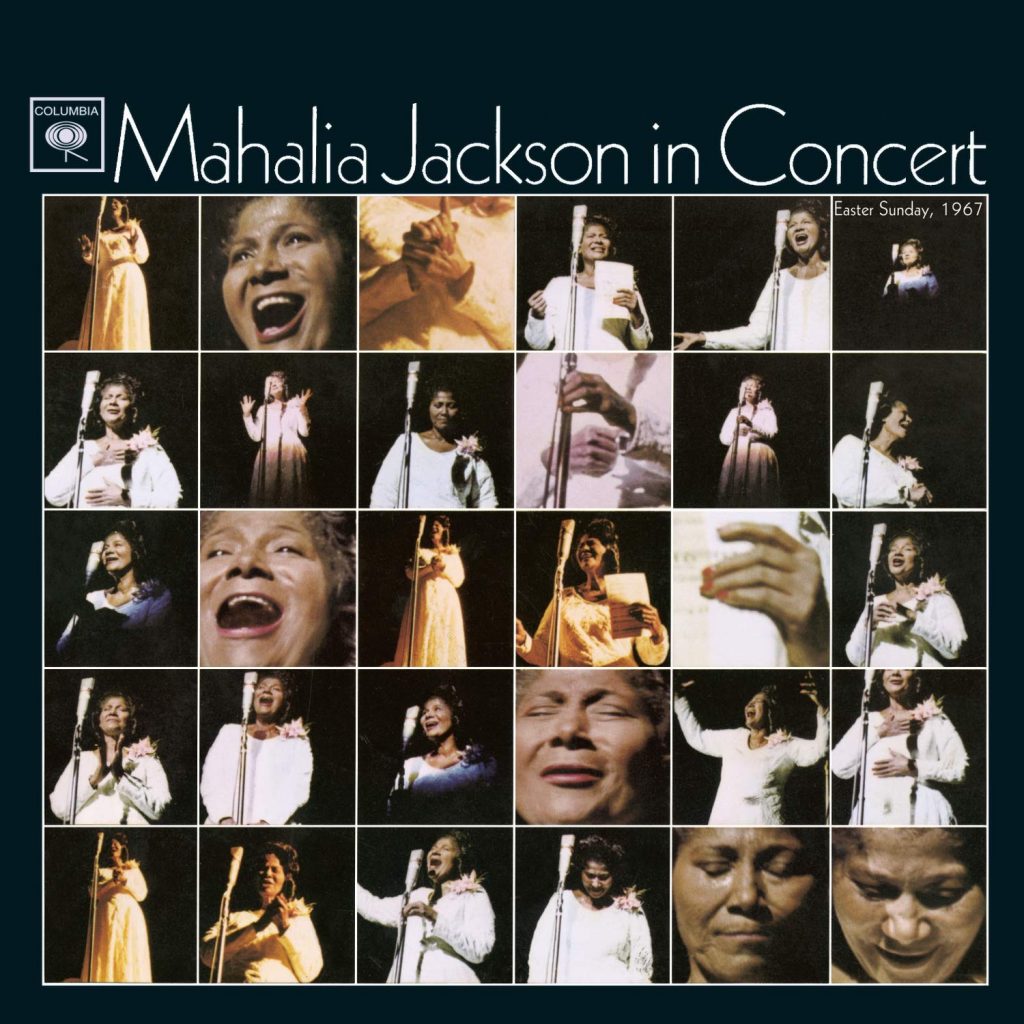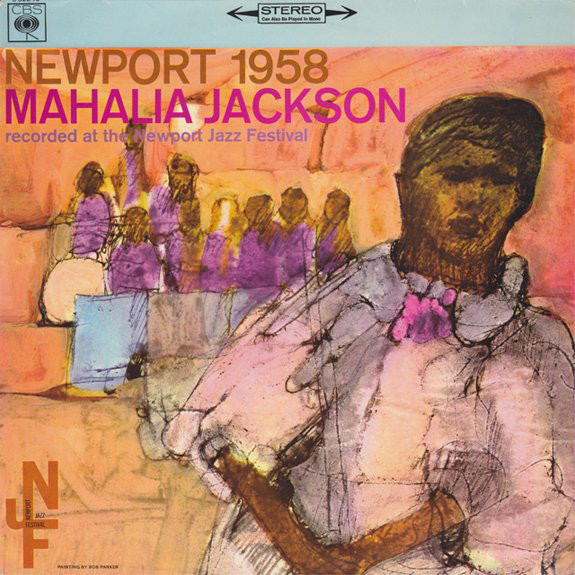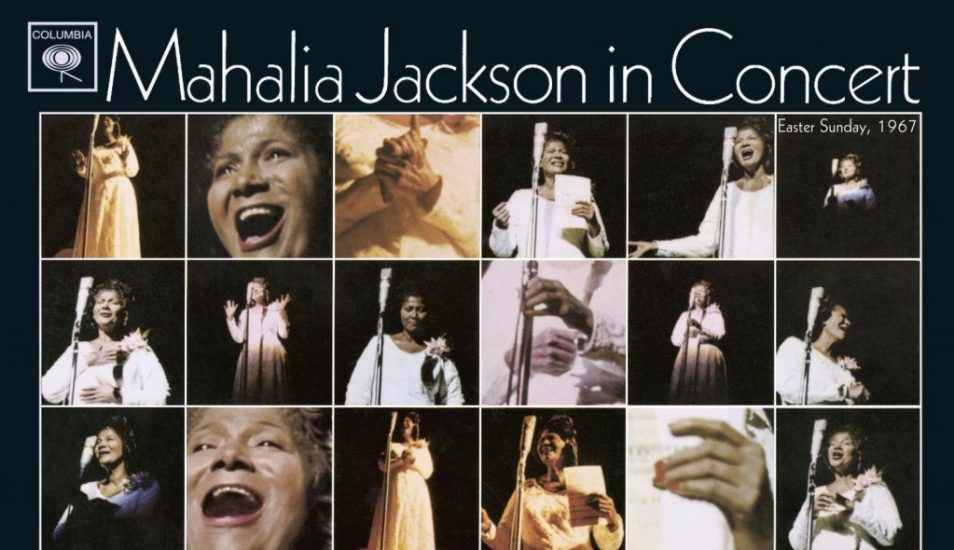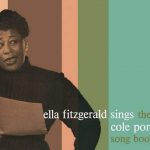Tunes For These Times, ‘Mahalia Jackson in Concert, Easter Sunday, 1967’
Editor’s Note: Like many of us self-isolating during the COVID-19 pandemic, I’ve been turning to music. As I pulled out albums from my collection, I discovered a consistent theme — I was selecting favorites that have long brought me joy. I’ve decided to share some of these —and the stories behind them — on a regular basis in hopes they’ll help. I’m choosing to focus on the lesser known recordings by some of our most-cherished artists. I’ve made sure to only include albums that are widely available on streaming services so they can be safely enjoyed at home. Please stay safe, everybody!
Recorded on Easter Sunday, March 26, 1967 at New York City’s new Philharmonic Hall at Lincoln Center, this concert served as a resurrection of sorts for the career of gospel great Mahalia Jackson. For three years, the icon touted by her label, Columbia Records as “The World’s Greatest Gospel Singer,” had been sidelined by heart-related ailments.
This concert, in contrast to the sometimes syrupy, strings-laden affairs arranged by Columbia craftsman like Percy Faith, got Mahalia back to her church roots. With just her long-time pianist Mildred Falls, an organist, a guitarist and a drummer (who added some well-placed Baptist church tambourine to the proceedings).
Specifically, for this concert, Mahalia had selected some of her favorite Easter hymns, including “He Will Remember Me,” “He Was Alone,” “Calvary” and the powerful second side opener, “Were You There?”
Beautifully recorded in stereo, co-produced by Irving Townsend and Gary Keys, “Mahalia Jackson, In Concert Easter Sunday, 1967” places the listener in one of the hall’s 2,600-seats, showcasing both the new hall’s powerful acoustics (at the time, it was built with the intent of replacing Carnegie Hall) and Mahalia’s powerful return to live performance.

Wrote New Yorker critic Whitney Balliett in the magazine’s April 8, 1967 issue and reprinted on the album’s back jacket: “Miss Jackson does not give concerts, she creates an experience. She expresses in her gospel songs and spirituals an ardor, that no saint has surpassed. All the songs were stirring, but one, ‘Were You There?’ was nearly unbearable. It was full of deep, aching, bent notes. Jackson used husky tones and shouting silences.”
With the power of a major American record label behind her, Jackson had overcome a difficult upbringing to become the globe’s most successful and well-known gospel singer, often earning $5,000 per concert (according to “Go Tell It: Mahalia Jackson, Queen of Gospel” biographer Jules Schwerin, the singer would often leave a singing engagement with her pay — in cash — safety pinned to her brassiere).
With her worldwide fame, Jackson used her voice for good. At Dr. Martin Luther King Jr.’s request, she sang “I Been ‘Buked” just before he was due to speak at the March on Washington in 1963.
After her fellow renters objected to her singing as she cooked in her Chicago apartment (imagine that for a moment), Jackson single-handedly integrated a Southside neighborhood when she purchased a house in an all-white zip code. She endured bullets through her windows and had police posted outside for nearly a year. But she refused to leave.
In her 1966 memoir, “Movin’ On Up,” Jackson reflected, “Today the neighborhood is almost entirely colored — doctors, lawyers, businessmen and their families. The grass is still green. The lawns are as neat as ever. Children still whiz up and down on their bikes. On Sunday mornings when I sit in my garden, it’s so quiet all you can hear is the birds singing. The same birds are still in the trees. I guess it didn’t occur to them to leave because we moved in.”
With the exception of recording a handful of secular tunes throughout her career, including Irving Berlin’s “White Christmas,” George Gershwin’s “Summertime” from “Porgy and Bess” and the Burt Bacharach and Hal David 1965 hit “What the World Needs Now Is Love,” Jackson never strayed far from what she considered her God-given mission — sharing her faith and His word to the masses.
But Jackson’s voice transcends the confines of church or any single religion. More than 30 years after its release, when “Mahalia Jackson in Concert” finally made its debut on CD, music critic Owen McNally wrote: “You don’t have to be a member of the Pentecostal church to appreciate the impassioned qualities of her voice — one of the most spectacular, pure sounds of the 20th century. Christians, Jews, Muslims, Buddhists, Hindus, atheists and agnostics can tune in and find much beauty in the eloquent, intimate world Jackson creates.”
Or as Jackson herself summarized in her memoir, “Movin’ On Up,” “Gospel music is nothing but singing of good tidings — spreading the good news. It will last as long as any music because it is sung straight from the human heart.”
And after spending months in a hospital recovering from ailments relating to the human body’s most vital organ, on “In Concert, Easter Sunday 1967,” Mahalia Jackson’s heart is on ample display, dazzling and delighting us still.

If you like “In Concert, Easter Sunday 1967,” check out the singer’s “Live at Newport, 1958,” Jackson’s transcendent midnight performance at the Newport Jazz Festival and “Bless This House,” her spare but powerful 1956 studio recording with pianist Mildred Falls and organist Ralph Jones.

Richard L. Eldredge is the founder and editor in chief of Eldredge ATL. As a reporter for the Atlanta Journal-Constitution and Atlanta magazine, he has covered Atlanta since 1990.




